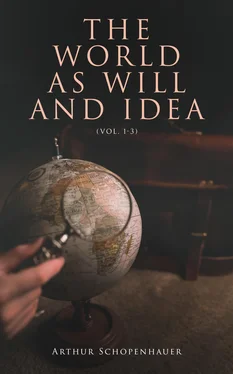The subject which will therefore be fully considered in the next book, and which has, doubtless, already presented itself to the mind of every student of Plato, is, that these different grades of the objectification of will which are manifested in innumerable individuals, and exist as their unattained types or as the eternal forms of things, not entering themselves into time and space, which are the medium of individual things, but remaining fixed, subject to no change, always being, never becoming, while the particular things arise and pass away, always become and never are—that these grades of the objectification of will are, I say, simply Plato's Ideas . I make this passing reference to the matter here in order that I may be able in future to use the word Idea in this sense. In my writings, therefore, the word is always to be understood in its true and original meaning given to it by Plato, and has absolutely no reference to those abstract productions of dogmatising scholastic reason, which Kant has inaptly and illegitimately used this word to denote, though Plato had already appropriated and used it most fitly. By Idea, then, I understand every definite and fixed grade of the objectification of will, so far as it is thing-in-itself, and therefore has no multiplicity. These grades are related to individual things as their eternal forms or prototypes. The shortest and most concise statement of this famous Platonic doctrine is given us by Diogenes Laertes (iii. 12): “ὁ Πλατων φησι, εν τῃ φυσει τας ιδεας ἑσταναι, καθαπερ παραδειγματα, τα δ᾽ αλλα ταυταις εοικεναι, τουτων ὁμοιωματα καθεστωτα”—(“Plato ideas in natura velut exemplaria dixit subsistere; cetera his esse similia, ad istarum similitudinem consistentia”). Of Kant's misuse of the word I take no further notice; what it is needful to say about it will be found in the Appendix.
§ 26. The lowest grades of the objectification of will are to be found in those most universal forces of nature which partly appear in all matter without exception, as gravity and impenetrability, and partly have shared the given matter among them, so that certain of them reign in one species of matter and others in another species, constituting its specific difference, as rigidity, fluidity, elasticity, electricity, magnetism, chemical properties and qualities of every kind. They are in themselves immediate manifestations of will, just as much as human action; and as such they are groundless, like human character. Only their particular manifestations are subordinated to the principle of sufficient reason, like the particular actions of men. They themselves, on the other hand, can never be called either effect or cause, but are the prior and presupposed conditions of all causes and effects through which their real nature unfolds and reveals itself. It is therefore senseless to demand a cause of gravity or electricity, for they are original forces. Their expressions, indeed, take place in accordance with the law of cause and effect, so that every one of their particular manifestations has a cause, which is itself again just a similar particular manifestation which determines that this force must express itself here, must appear in space and time; but the force itself is by no means the effect of a cause, nor the cause of an effect. It is therefore a mistake to say “gravity is the cause of a stone falling;” for the cause in this case is rather the nearness of the earth, because it attracts the stone. Take the earth away and the stone will not fall, although gravity remains. The force itself lies quite outside the chain of causes and effects, which presupposes time, because it only has meaning in relation to it; but the force lies outside time. The individual change always has for its cause another change just as individual as itself, and not the force of which it is the expression. For that which always gives its efficiency to a cause, however many times it may appear, is a force of nature. As such, it is groundless, i.e., it lies outside the chain of causes and outside the province of the principle of sufficient reason in general, and is philosophically known as the immediate objectivity of will, which is the “in-itself” of the whole of nature; but in etiology, which in this reference is physics, it is set down as an original force, i.e., a qualitas occulta.
In the higher grades of the objectivity of will we see individuality occupy a prominent position, especially in the case of man, where it appears as the great difference of individual characters, i.e., as complete personality, outwardly expressed in strongly marked individual physiognomy, which influences the whole bodily form. None of the brutes have this individuality in anything like so high a degree, though the higher species of them have a trace of it; but the character of the species completely predominates over it, and therefore they have little individual physiognomy. The farther down we go, the more completely is every trace of the individual character lost in the common character of the species, and the physiognomy of the species alone remains. We know the physiological character of the species, and from that we know exactly what is to be expected from the individual; while, on the contrary, in the human species every individual has to be studied and fathomed for himself, which, if we wish to forecast his action with some degree of certainty, is, on account of the possibility of concealment that first appears with reason, a matter of the greatest difficulty. It is probably connected with this difference of the human species from all others, that the folds and convolutions of the brain, which are entirely wanting in birds, and very weakly marked in rodents, are even in the case of the higher animals far more symmetrical on both sides, and more constantly the same in each individual, than in the case of human beings.34 It is further to be regarded as a phenomenon of this peculiar individual character which distinguishes men from all the lower animals, that in the case of the brutes the sexual instinct seeks its satisfaction without observable choice of objects, while in the case of man this choice is, in a purely instinctive manner and independent of all reflection, carried so far that it rises into a powerful passion. While then every man is to be regarded as a specially determined and characterised phenomenon of will, and indeed to a certain extent as a special Idea, in the case of the brutes this individual character as a whole is wanting, because only the species has a special significance. And the farther we go from man, the fainter becomes the trace of this individual character, so that plants have no individual qualities left, except such as may be fully explained from the favourable or unfavourable external influences of soil, climate, and other accidents. Finally, in the inorganic kingdom of nature all individuality disappears. The crystal alone is to be regarded as to a certain extent individual. It is a unity of the tendency in definite directions, fixed by crystallisation, which makes the trace of this tendency permanent. It is at the same time a cumulative repetition of its primitive form, bound into unity by an idea, just as the tree is an aggregate of the single germinating fibre which shows itself in every rib of the leaves, in every leaf, in every branch; which repeats itself, and to some extent makes each of these appear as a separate growth, nourishing itself from the greater as a parasite, so that the tree, resembling the crystal, is a systematic aggregate of small plants, although only the whole is the complete expression of an individual Idea, i.e., of this particular grade of the objectification of will. But the individuals of the same species of crystal can have no other difference than such as is produced by external accidents; indeed we can make at pleasure large or small crystals of every species. The individual, however, as such, that is, with traces of an individual character, does not exist further in unorganised nature. All its phenomena are expressions of general forces of nature, i.e., of those grades of the objectification of will which do not objectify themselves (as is the case in organised nature), by means of the difference of the individualities which collectively express the whole of the Idea, but show themselves only in the species, and as a whole, without any variation in each particular example of it. Time, space, multiplicity, and existence conditioned by causes, do not belong to the will or to the Idea (the grade of the objectification of will), but only to their particular phenomena. Therefore such a force of nature as, for example, gravity or electricity, must show itself as such in precisely the same way in all its million phenomena, and only external circumstances can modify these. This unity of its being in all its phenomena, this unchangeable constancy of the appearance of these, whenever, under the guidance of causality, the necessary conditions are present, is called a law of nature . If such a law is once learned from experience, then the phenomenon of that force of nature, the character of which is expressed and laid down in it, may be accurately forecast and counted upon. But it is just this conformity to law of the phenomena of the lower grades of the objectification of will which gives them such a different aspect from the phenomena of the same will in the higher, i.e., the more distinct, grades of its objectification, in animals, and in men and their actions, where the stronger or weaker influence of the individual character and the susceptibility to motives which often remain hidden from the spectator, because they lie in knowledge, has had the result that the identity of the inner nature of the two kinds of phenomena has hitherto been entirely overlooked.
Читать дальше












